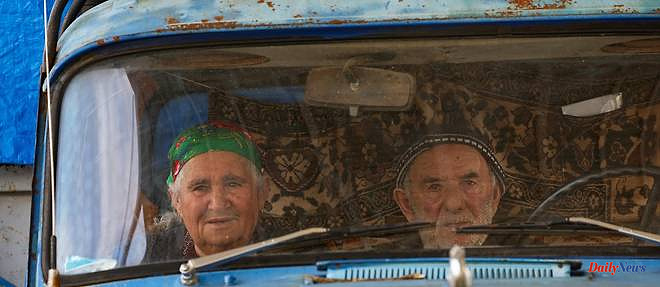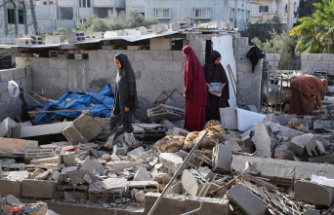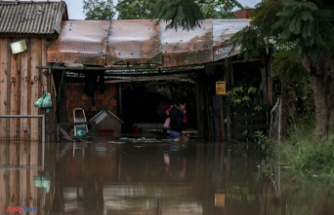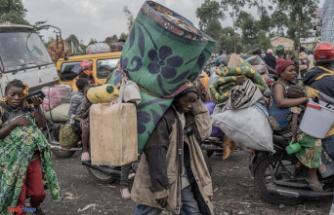Armenia continues to welcome tens of thousands of refugees fleeing Nagorno Karabakh on Wednesday, a week after a lightning offensive by Azerbaijan in this separatist region of the Caucasus.
Some 28,120 refugees have arrived in Armenia so far, Armenian authorities said on Tuesday. Last week, Armenian Prime Minister Nikol Pashinian announced that his country of 2.9 million inhabitants was preparing to welcome 40,000 refugees from Nagorno Karabakh.
Azerbaijan pledged to allow rebels who surrender their weapons to go to Armenia, and opened the only road linking Nagorno Karabakh to that country on Sunday, four days after the capitulation of the separatists and a cease-fire agreement. -fire which places the region of around 120,000 inhabitants, populated mainly by Armenians, under the control of Baku.
The influx of refugees has caused huge traffic jams. An endless stream of vehicles carrying families and their belongings piled on the roofs parade day and night in front of the last Azerbaijani checkpoint before Armenian territory, via the Lachin corridor.
Many say it took 24 hours to travel the 80 kilometers separating the separatist "capital", Stepanakert, from the border. A journey made without food and sometimes without water: Nagorno Karabakh, subject to Azerbaijan's blockade for months, lacks everything.
Azerbaijani soldiers check trunks, peeking inside, without asking for any identity document. The men are asked to come down to fix surveillance cameras, next to an Azerbaijani flag fluttering in the wind.
The maneuver is intended to detect possible perpetrators of “war crimes” fleeing Karabakh, an Azerbaijani government source explained to AFP.
Some refugees arrive on foot. “They expelled us,” says one man.
“I left my house to stay alive,” asserts a woman in a green jacket, who insists on speaking: “Let the world know that we are homeless dogs now!”
First stop for most of the refugees, the border town of Goris, populated by around twenty thousand inhabitants, has been submerged since Sunday evening. In front of the city theater, white minibuses arrive constantly. Others leave, their trunks loaded with luggage, towards the capital Yerevan and other major Armenian cities.
Monday evening, in the midst of an exodus, a fuel depot exploded in the enclave, leaving at least 68 dead, 290 injured and 105 people missing, separatist authorities announced.
Armenia and Azerbaijan are two former Soviet republics which clashed militarily in Nagorno Karabakh from 1988 to 1994 (30,000 dead) and in the fall of 2020 (6,500 dead). The death toll from last week's blitzkrieg invasion is 200, according to the Armenian side.
On Monday, Azerbaijani President Ilham Aliyev reaffirmed the promise that the rights of Armenians in the enclave, attached to Azerbaijan in 1921 by the USSR, would be “guaranteed”.
The European Union brought together senior French, German, Azerbaijani and Armenian diplomatic officials in Brussels on Tuesday.
According to the EU press release, the discussions allowed "intense exchanges between participants on the relevance of a possible meeting of the leaders" of Armenia and Azerbaijan, on the sidelines of an informal European summit of 27 in Granada, Spain on October 5.
This summit was planned for a long time and was not canceled.
The head of American diplomacy Antony Blinken called on Tuesday Azerbaijan to respect its commitments to protect civilians in the province and to allow access for humanitarian aid.
"The Secretary of State spoke again with President Aliyev today and emphasized the urgency of ending hostilities, ensuring the unconditional protection and freedom of movement of civilians, and ensuring access unhindered humanitarian action in Nagorno-Karabakh," State Department spokesperson Matthew Miller said.
France, for its part, called for "international diplomatic action" in the face of "Russia's abandonment of Armenia."
Paris estimated that the “massive” exodus of Armenians from Nagorno Karabakh is taking place “under the complicit eye of Russia”, which had deployed a peacekeeping force in this region in 2020.
27/09/2023 11:05:39 - LATCHINE CORRIDOR (Azerbaïdjan) (AFP) - © 2023 AFP












